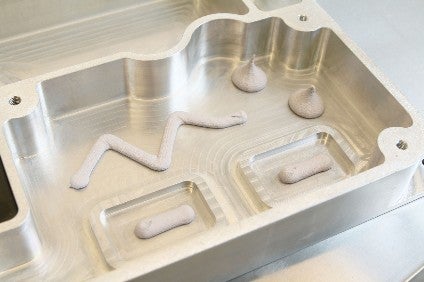
Henkel has launched a new thermal interface material (TIM) called Bergquist Gap Filler TGF 7000.
It claims the the liquid TIM is a "major formulation breakthrough, as it effectively marries high thermal conductivity of 7.0W/mK with a maximum possible speed tested of 18 grams per second, a combination which is currently the only one of its kind".

Discover B2B Marketing That Performs
Combine business intelligence and editorial excellence to reach engaged professionals across 36 leading media platforms.
With excellent throughput capability, the novel material is claimed well suited for applications such as automotive ADAS systems, power conversion systems, electric pumps and ECUs where mass production, reliability and high thermal conductivity are required for smaller footprint, higher power designs.
"From a chemistry perspective, engineering a liquid TIM with substantive filler content that also allows fast dispensing is an exceptionally difficult balance to achieve," said Holger Schuh, a Henkel global technology expert, emphasising the supplier's expertise in resin technology and thermal material formulation.
"One might expect a liquid material with high thermal conductivity to experience separation, settling, caking and clogging of the dispensing equipment but [the new TIM] exhibits none of these issues."
Henkel said the silicone-based, two-part liquid gap filling TIM dispenses quickly at a maximum possible tested speed of 18 grams per second and cures in place at room temperature.
The material is soft upon cure to minimise stress and has controlled volatility with siloxane content below 300 parts per million (ppm) to provide compatibility with various bonding surfaces and optical components.
Manufacturers also benefit from risk free logistics as storage stability and easy handling are also key attributes.
Henkel noted it had "cultivated solid technology partnerships with the industry's leading dispensing equipment suppliers" so its technical team was well-versed on liquid TIM material optimisation for various equipment platforms, also critical for volume manufacturing.
Working with dispense partners during development, significant testing was conducted to validate the dispensability of the product.
"High-performance liquid gap fillers set high requirements on the dispensing technology: to ensure a precise application without raising the working pressure or to engineer a durable resin circuit that can cope with high abrasive fillers. With our eccentric screw pumps and static mixing system Duplex+, we are able to set up a high-volume dispensing process with excellent cmk-results and cycle times," said Florian Schütz, regional sales manager DACH from Bdtronic.
"Unlike common expectations for higher thermally conductive materials, the material has shown outstanding characteristics in dispensing without stressing the equipment during our early dispensing tests."
To further evaluate the material within various environments, Henkel has engaged industry research firm ZFW Stuttgart (Zentrum fur Waermemanagement).
Using thermal analysis and measurement technology, the institute studied the thermal performance of TGF 7000 under various stress situations.
"For next-generation automotive designs where form and function are inherently linked, smaller, high-power components are enabling lighter, sleeker and more sophisticated vehicles," said Schuh.
He claimed: "Without effective thermal control solutions like our new gap filler, these advances would not be possible."






